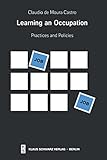Learning an Occupation : Practices and Policies / Claudio de Moura Castro.
Material type: TextPublisher: Berlin : Klaus Schwarz Verlag, [2022]Copyright date: ©2022Description: 1 online resource (292 p.)Content type:
TextPublisher: Berlin : Klaus Schwarz Verlag, [2022]Copyright date: ©2022Description: 1 online resource (292 p.)Content type: - 9783879974108
- 9783112402214
- online - DeGruyter
- Issued also in print.
| Item type | Current library | Call number | URL | Status | Notes | Barcode | |
|---|---|---|---|---|---|---|---|
 eBook
eBook
|
Biblioteca "Angelicum" Pont. Univ. S.Tommaso d'Aquino Nuvola online | online - DeGruyter (Browse shelf(Opens below)) | Online access | Not for loan (Accesso limitato) | Accesso per gli utenti autorizzati / Access for authorized users | (dgr)9783112402214 |
Browsing Biblioteca "Angelicum" Pont. Univ. S.Tommaso d'Aquino shelves, Shelving location: Nuvola online Close shelf browser (Hides shelf browser)
Frontmatter -- Table of Content -- Preface -- Chapter I. The Art and Science of Training -- Chapter II. Training Policies that Make Sense -- Chapter III. The Latin American Panorama -- Chapter IV. Multilateral Agencies: Understanding the Beasts -- Monitoring Training Projects -- References -- Full Table of Content -- Backmatter
restricted access online access with authorization star
http://purl.org/coar/access_right/c_16ec
Education and training have often been considered as polar extremes, the first being the development of the mind and the latter the mastery of strictly practical endeavours. But the two worlds of practical and conceptual endeavours are less distant than it may seem and these simplistic views of education and training are misguided. Indeed, there are definitional problems concerning education and training, leading to misguided policies. There is a need for a clear understanding of the overlaps and contrasts between the two concepts. The papers collected in this book reflect the past experience of the author, working in Brazil, for the ILO, for the World Bank and for the Interamerican Development Bank; in addition, as an outside observer, watching SENAI (the Brazilian Industrial Training Service) and other similar institutions in the country. They are neither theoretical exercises nor efforts to count heads. Instead, the papers result from the effort to understand training, as it happens inside schools and training centres. But also, looking at a broader picture and asking what policies are appropriate to deal with them as a group.
Issued also in print.
Mode of access: Internet via World Wide Web.
In English.
Description based on online resource; title from PDF title page (publisher's Web site, viewed 01. Dez 2022)









